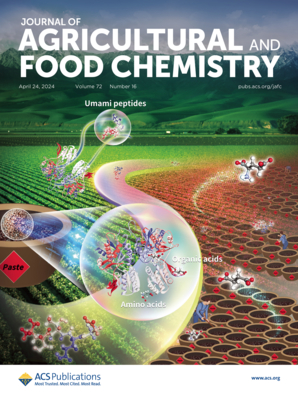Acid-Enzyme Derived Agarotriose Facilitates Anti-Inflammatory Activity for Dextran Sulfate Sodium-Induced Colitis Alleviation as a Food Supplement.
IF 5.7
1区 农林科学
Q1 AGRICULTURE, MULTIDISCIPLINARY
引用次数: 0
Abstract
Ulcerative colitis (UC) is a chronic inflammatory bowel disease with inadequate therapeutic options and has a significant impact on patient quality of life. We optimized the preparation of agarotriose (A3), a functional oligosaccharide, and assessed its health-promoting potential in a dextran sulfate sodium-induced UC mouse model. The beneficial effects of A3 were evaluated through histopathological, biochemical, immunological, and transcriptomic analyses. The medium dose (200 mg/kg) exhibited the greatest protective effect. A3 effectively restored substantial gut barrier integrity by dose-dependently increasing goblet cell numbers and enhancing the mucus layer thickness through MUC2 upregulation. It also re-established the continuous distribution of tight junction proteins (claudin-1, occludin, and ZO-1), thereby reinforcing gut barrier function. Biochemically, A3 mitigated oxidative stress by reducing malondialdehyde and myeloperoxidase levels, while enhancing antioxidant defenses by boosting total antioxidant capacity and total superoxide dismutase activity. Immunologically, A3 notably suppressed pro-inflammatory cytokines (tumor necrosis factor-alpha, interleukin-1β, and IL-6) and increased anti-inflammatory IL-10 levels, promoting a protective immune response. Transcriptomic profiling identified 3871 differentially expressed genes, with A3 downregulating the phosphatidylinositol 3-kinase/protein kinase B/mammalian target of rapamycin (PI3K/Akt/mTOR) signaling pathway─a key regulator of inflammation and cell survival. This was further confirmed by reduced PI3K, Akt, and mTOR phosphorylation, verifying pathway suppression.酸酶衍生琼脂糖促进抗炎活性的葡聚糖硫酸盐钠诱导的结肠炎缓解作为一种食物补充剂。
溃疡性结肠炎(UC)是一种慢性炎症性肠病,治疗方案不足,对患者的生活质量有重大影响。我们优化了功能性低聚糖琼脂糖(A3)的制备工艺,并在葡聚糖硫酸钠诱导的UC小鼠模型中评估了其促进健康的潜力。通过组织病理学、生化、免疫学和转录组学分析评估A3的有益作用。中剂量(200 mg/kg)的保护效果最好。A3通过剂量依赖性地增加杯状细胞数量和通过MUC2上调增加黏液层厚度,有效地恢复了肠道屏障的完整性。它还重新建立了紧密连接蛋白(claudin-1、occludin和ZO-1)的连续分布,从而加强了肠道屏障功能。从生化角度看,A3通过降低丙二醛和髓过氧化物酶水平来减轻氧化应激,同时通过提高总抗氧化能力和总超氧化物歧化酶活性来增强抗氧化防御。免疫方面,A3显著抑制促炎细胞因子(肿瘤坏死因子- α、白细胞介素-1β和IL-6),增加抗炎IL-10水平,促进保护性免疫反应。转录组学分析鉴定出3871个差异表达基因,其中A3下调了磷脂酰肌醇3-激酶/蛋白激酶B/哺乳动物雷帕霉素靶蛋白(PI3K/Akt/mTOR)信号通路,这是炎症和细胞存活的关键调节因子。PI3K、Akt和mTOR磷酸化降低进一步证实了这一点,证实了途径抑制。
本文章由计算机程序翻译,如有差异,请以英文原文为准。
求助全文
约1分钟内获得全文
求助全文
来源期刊
CiteScore
9.90
自引率
8.20%
发文量
1375
审稿时长
2.3 months
期刊介绍:
The Journal of Agricultural and Food Chemistry publishes high-quality, cutting edge original research representing complete studies and research advances dealing with the chemistry and biochemistry of agriculture and food. The Journal also encourages papers with chemistry and/or biochemistry as a major component combined with biological/sensory/nutritional/toxicological evaluation related to agriculture and/or food.

 求助内容:
求助内容: 应助结果提醒方式:
应助结果提醒方式:


